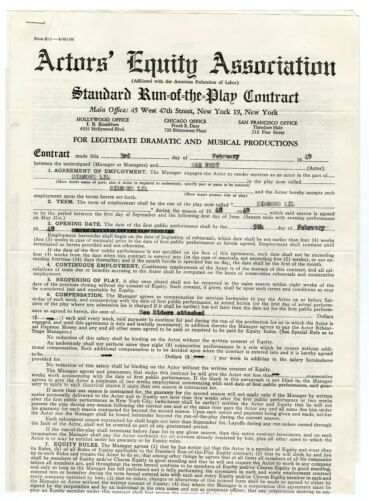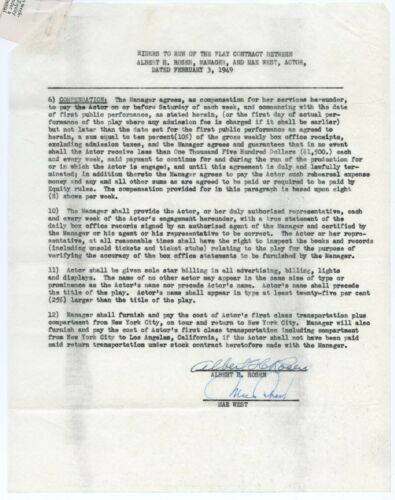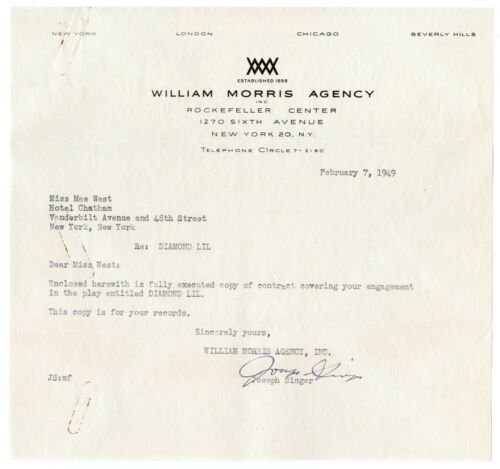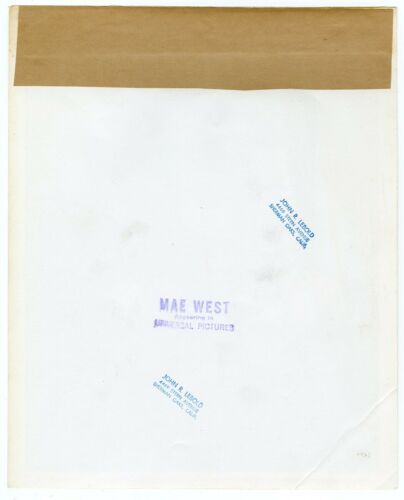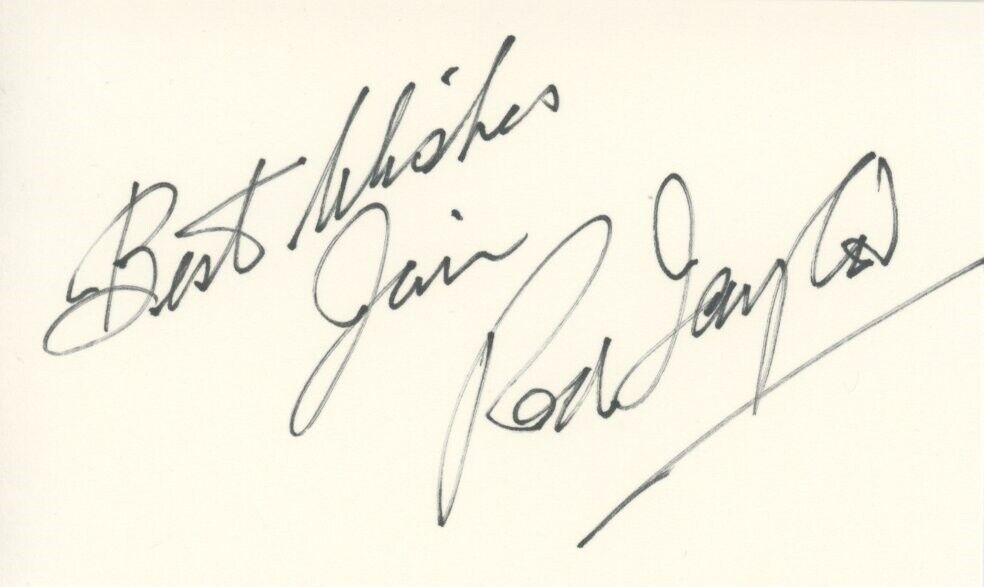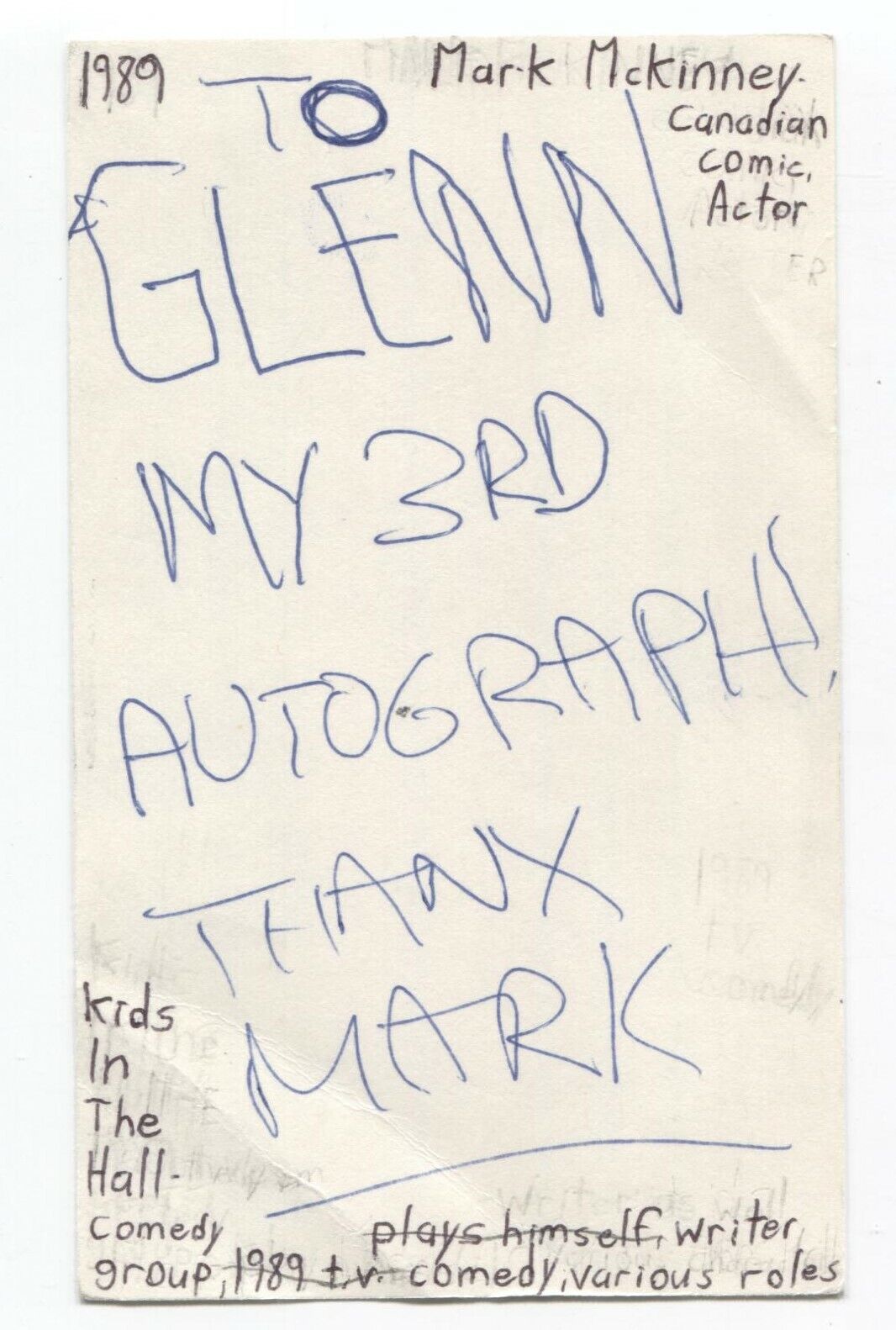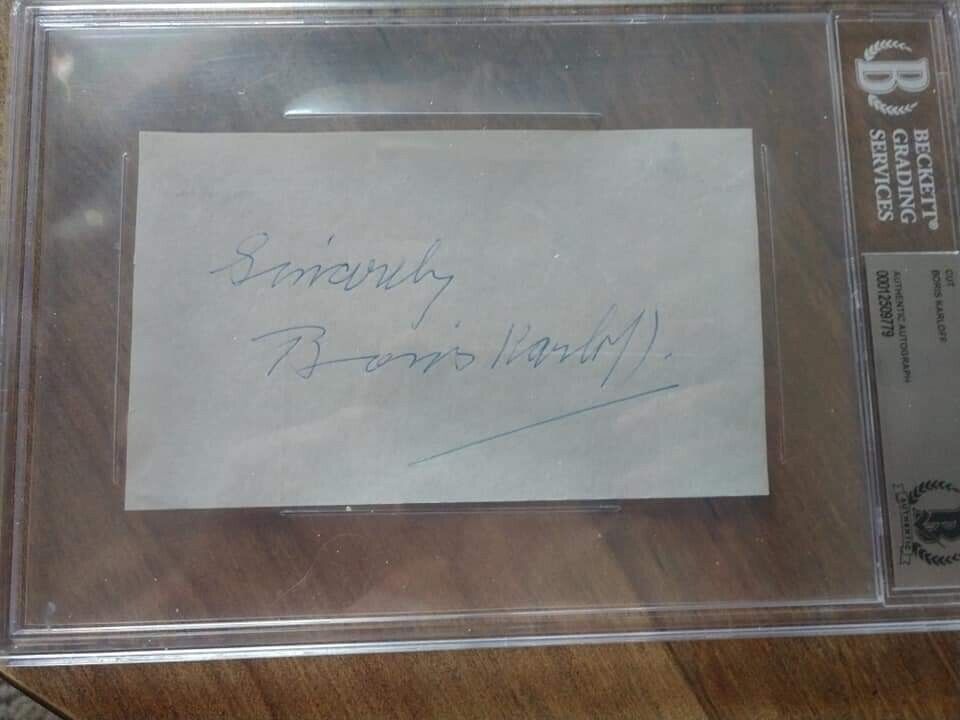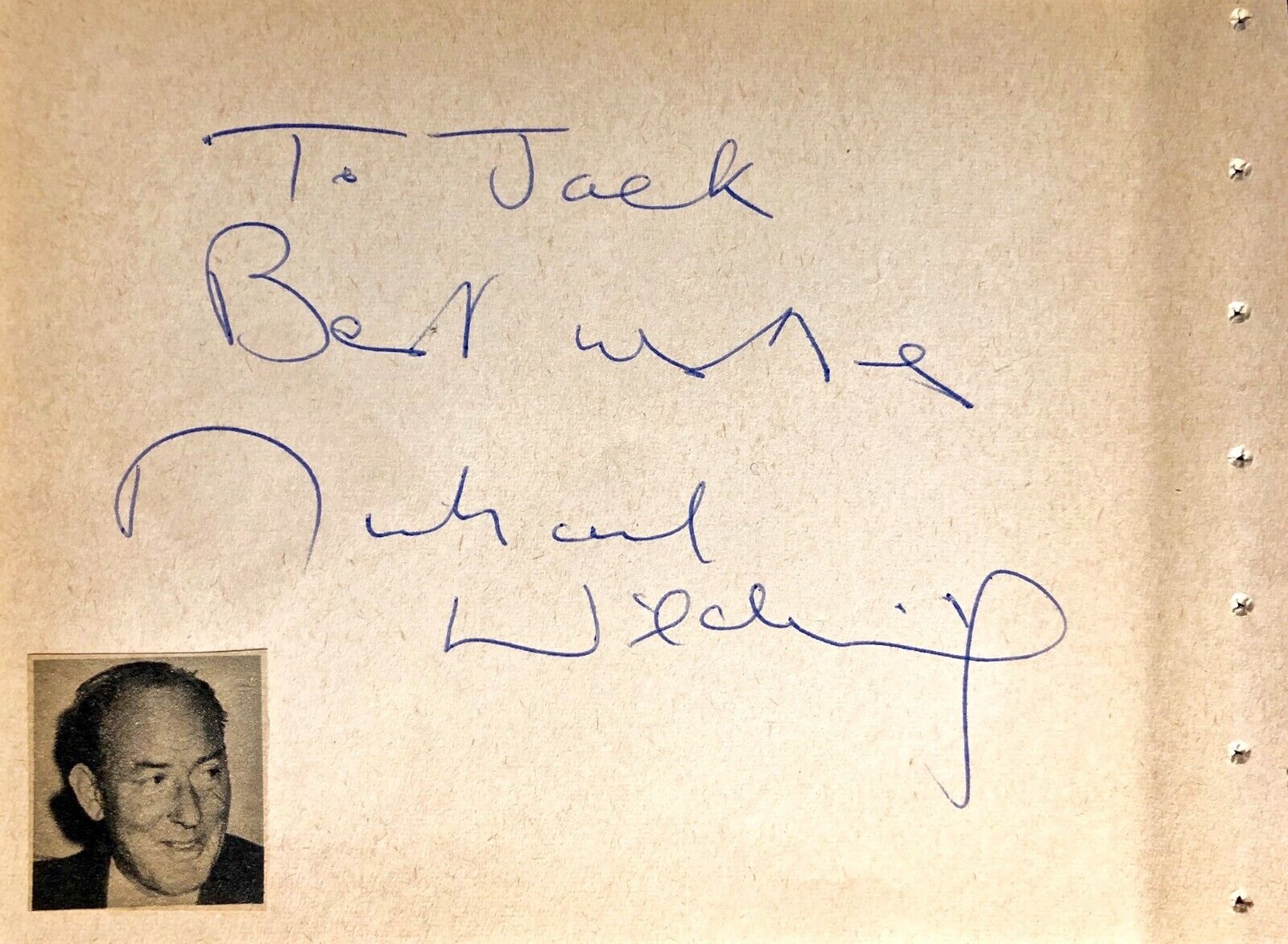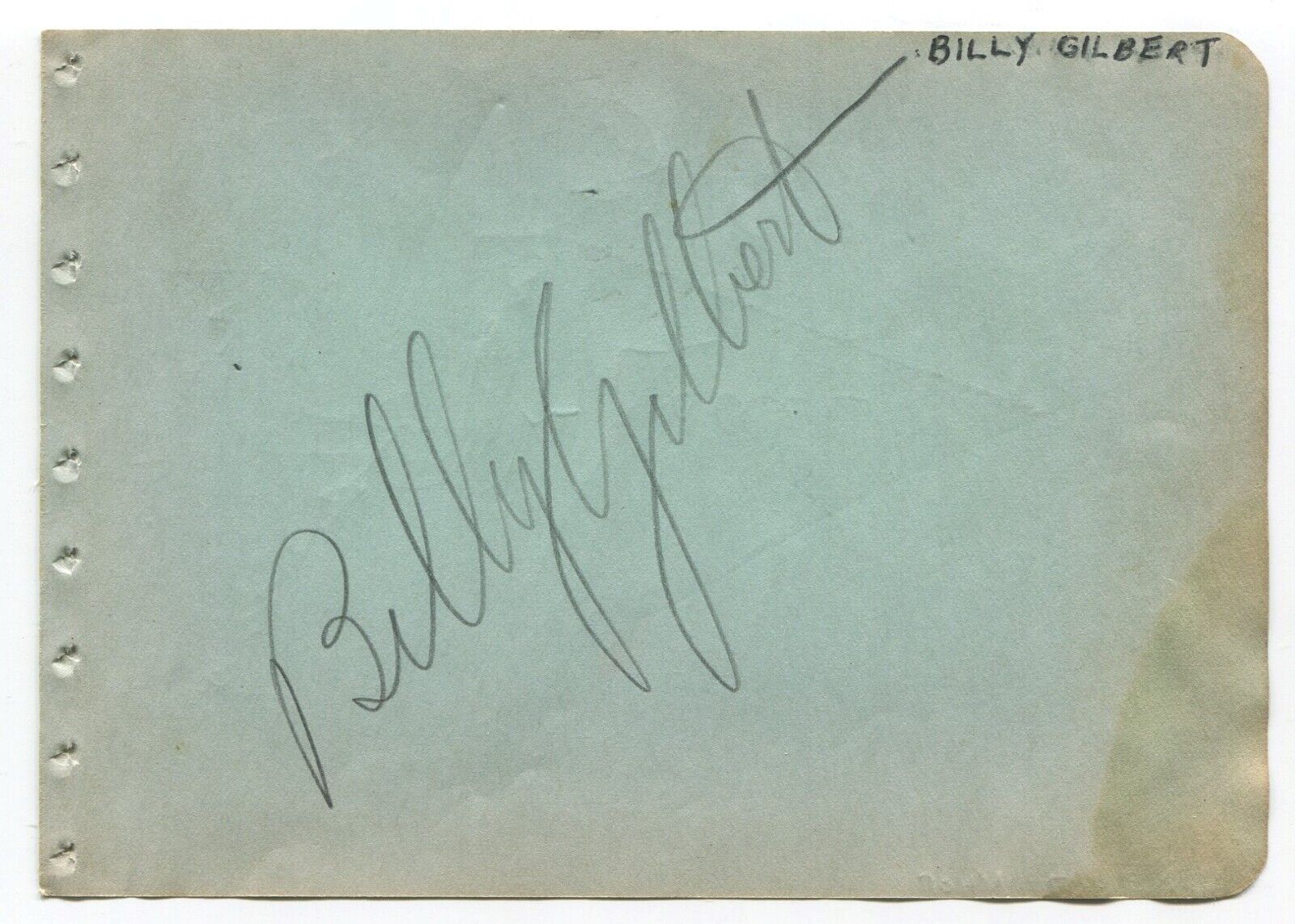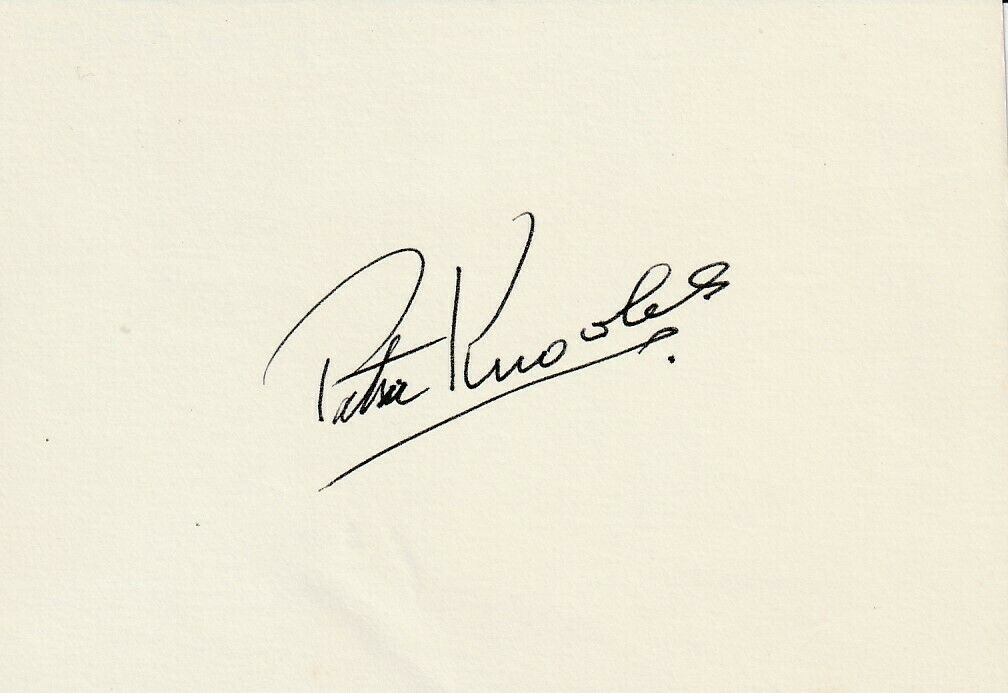-40%
MAE WEST DIAMOND LIL PLAY 1949 ORIGINAL SIGNED CONTRACT AUTOGRAPHED + PHOTOGRAPH
$ 20.06
- Description
- Size Guide
Description
MAE WEST DIAMOND LIL PLAY 1949 ORIGINAL SIGNED CONTRACT AUTOGRAPHED + PHOTOGRAPHPROVENANCE:
From the personal collection of
MAE WEST
, whose material passed to her nephew, John West, after her death in 1980.
DESCRIPTION:
Actress
MAE WEST
authentic signed vintage February 3, 1949 original 1 page (2-sided)
Actors' Equity Association
standard run-of-the-play contract agreement for her play,
DIAMOND LIL
, signed at the bottom of the first page with a blue ink fountain pen.
Accompanied by an attached rider also signed by Ms. West. Includes a typed letter signed from William Morris Agency and the original mailing envelope, as well as a vintage original gelatin silver glossy 8" x 10" Universal Studios publicity photograph of the actress.
·
Certified 100% authentic original hand signed. This autographed item has been authenticated by MY MOVIE MEMORABILIA & MORE, a UACC (Universal Autograph Collectors Club) Registered Dealer (No. RD321), which must abide by the UACC Code of Ethics, all policies that the UACC has enacted and must have a good standing as a reputable dealer recommended by long-term UACC dealers. We have years of experience selling to buyers internationally with a 100% positive feedback. All of my autographed items have a lifetime money back guarantee of authenticity.
-
SIZE:
8 1/2" x 22" (contract), 8" x 10" (photograph)
__________________________________________________________
SHIPPING TERMS
-
I ship all items using, what I call, triple protection packing. The photos are inserted into a display bag with a white board, then packed in between two thick packaging boards and lastly wrapped with plastic film for weather protection before being placed into the shipping envelope.
-
The shipping cost for U.S. shipments includes USPS "Delivery Confirmation" tracking.
-
Combined Shipping Discounts: If you purchase more than one item within a two week period that will be shipped together just add .00 to the base shipping cost. This will cover any additional quantity of a similar item purchased. If you purchase different types of items (i.e. clothes and photos) please contact me for the lowest possible shipping discount.
Please wait for me to issue the invoice with the reduced shipping cost before making payment.
PAYMENT TERMS
- Please pay within three (3) days of purchase.
- I reserve the right to re-list the item(s) if payment is not received within seven (7) days.
- California residents - please wait for me to adjust the invoice to include California Sales Tax of 7.25% and 8.75% for Los Angeles residents.
CUSTOMER SERVICE
I will respond to all inquiries within 24 hours. Please feel free to contact me anytime at 1-310-880-8140 (Pacific Standard Time)
________________________________________________________________________
MAE WEST BIO
(August 17, 1893 ? November 22, 1980) was an American actress, playwright, screenwriter and sex symbol.
Known for her bawdy double entendres, West made a name for herself in Vaudeville and on the stage in New York before moving to Hollywood to become a comedienne, actress and writer in the motion picture industry. One of the more controversial movie stars of her day, West encountered many problems including censorship.
When her cinematic career ended, she continued to perform on stage, in Las Vegas, in the United Kingdom, on radio and television, and recorded rock and roll albums.
West was born
Mary Jane West
in Bushwick, Brooklyn, Kings County, New York, daughter of John Patrick West and Matilda "Tillie" Doelger (also spelled Delker).
Her father was a prizefighter known as "Battlin' Jack West" who later worked as a "special policeman" and then as a private investigator who ran his own agency. Her mother was a former corset and fashion model. The family was Protestant, although West's mother was reported as a Jewish immigrant from Bavaria. Her Irish Catholic paternal grandmother, as well as other relatives who were Roman Catholic, disapproved of her career and her choices, as did the aunt who helped deliver her. By some accounts, West's paternal grandfather, John Edwin, may have been an African American who
passed for white
.
Her siblings were Mildred Katherine West (December 8, 1898 ? March 12, 1982), known as Beverly, and John Edwin West (February 11, 1900 ? October 12, 1964). During her childhood, West's family moved to various parts of Woodhaven, Queens, as well as WilliamsburgGreenpoint in Brooklyn. She may have attended Erasmus Hall High School. and
At five years old West first entertained a crowd, at a church social, and she started appearing in amateur shows at the age of seven. She often won prizes at local talent contests. She began performing professionally in vaudeville in the Hal Clarendon Stock Company in 1907 at the age of fourteen. West first performed under the stage name
Baby Mae
, and tried various personas including a
male impersonator
, Sis Hopkins, and a blackface coon shouter. Her trademark walk was said to have been inspired or influenced by female impersonators Bert Savoy and Julian Eltinge, who were famous during the Pansy Craze. Her first appearance in a legitimate Broadway
A La Broadway
put on by her former dancing teacher, Ned Wayburn. The show folded after just eight performances. She then appeared in a show called "Vera Violetta," whose cast featured another newcomer, Al Jolson. In 1912 she also appeared in the opening performance of "A Winsome Widow" as a 'baby vamp' named La Petite Daffy. show was in a 1911 revue
Her photograph appeared on an edition of the sheet music for the popular number "Ev'rybody Shimmies Now" in 1918. She was encouraged as a performer by her mother, who, according to West, always thought that whatever her daughter did was fantastic.
In 1918, after exiting several high-profile revues, West finally got her break in the
Shubert Brothers
revue
Sometime
, opposite Ed Wynn. Her character Mayme danced the shimmy. Eventually, she began writing her own risqué plays using the pen name Jane Mast. Her first starring role on
Broadway
was in a play she titled
Sex
, which she also wrote, produced, and directed. Though critics hated the show, ticket sales were good. The notorious production did not go over well with city officials and the theater was raided with West arrested along with the cast.
She was prosecuted on morals charges and, on April 19, 1927, was sentenced to ten days for "corrupting the morals of youth".Roosevelt Island), she dined with the warden and his wife and told reporters that she wore her silk underpants while serving time. She served eight days with two days off for good behavior. Media attention about the case enhanced her career. Her next play,
The Drag
, dealt with homosexuality and was what West called one of her "comedy-dramas of life". After a series of try-outs in Connecticut and New Jersey, West announced she would open the play in New York.
The Drag
never opened on Broadway due to the Society for the Prevention of Vice vows to ban it if West attempted to stage it. West was an early supporter of the women's liberation movement, but stated she was not a
feminist
. She was also a supporter of gay rights. While incarcerated on Welfare Island (now known as However,
West continued to write plays, including
The Wicked Age
,
Pleasure Man
and
The Constant Sinner
. Her productions were plagued by controversy and other problems, although the controversy ensured that West stayed in the news and most of the time this resulted in packed performances. Her 1928 play,
Diamond Lil
, about a racy, easygoing lady of the 1890s, became a Broadway hit. This show enjoyed an enduring popularity and West would successfully revive it many times throughout the course of her career.
In 1932, West was offered a motion picture contract by Paramount Pictures. She was 38, unusually advanced for a first movie, especially for a sex symbol (though she kept her age ambiguous for several more years). West made her film debut in
Night After Night
George Raft. At first, she did not like her small role in
Night After Night,
but was appeased when she was allowed to rewrite her scenes.
[38]
In West's first scene, a hat check girl exclaims, "Goodness, what beautiful diamonds." West replies, "Goodness had nothing to do with it, dearie."
[39]
Reflecting on the overall result of her rewritten scenes, Raft is said to have remarked, "She stole everything but the cameras."
[39]
starring
She brought her
Diamond Lil
character, now renamed
Lady Lou
, to the screen in
She Done Him Wrong
(1933).
[40]
The film is also notable as one of Cary Grant's first major roles, which boosted his career. West claimed she spotted Grant at the studio and insisted that he be cast as the male lead.
[41]
The film was a box office hit and earned an
Academy Award
nomination for Best Picture.
[40][42]
The success of the film most likely saved Paramount from bankruptcy.
Her next release,
I'm No Angel
(1933), paired her with Grant again.
I'm No Angel
was also a financial success.
[44]
By 1933, West was the eighth-largest U.S. box office draw in the United States
[45]
and, by 1935, the second-highest paid person in the United States (after William Randolph Hearst).
[46]
On July 1, 1934, the censorship of the
Production Code
began to be seriously and meticulously enforced, and her screenplays were heavily edited.
West's next film was
Belle of the Nineties
(1934). Originally titled
It Ain't No Sin
, the title was changed due to the censors' objections.
[47]
Goin' to Town
(1935), received mixed reviews.
[48]
Her next film,
Her next film,
Klondike Annie
(1936), was concerned with religion and hypocrisy and was very controversial.
[49]
Many critics have called this film her screen masterpiece.
[50]
That same year, West played opposite Randolph Scott in
Go West, Young Man
. In this film, she adapted Lawrence Riley's Broadway hit
Personal Appearance
into a screenplay.
[4][51]
Directed by Henry Hathaway,
Go West, Young Man
[52]
After this film, West starred in
Every Day's a Holiday
(1937) for Paramount before their association came to an end. is considered one of West's weaker films of the era.
In 1939, Universal Pictures approached West to star in a film opposite W. C. Fields. The studio was eager to duplicate the success of
Destry Rides Again
starring Marlene Dietrich and
James Stewart
with a vehicle starring West and Fields.
[53]
Having left Paramount eighteen months earlier and looking for a comeback film, West accepted the role of Flower Belle Lee in the film
My Little Chickadee
[53][54]
Despite mutual dislike between West and Fields (at least in part because West was a teetotaler who disapproved of Fields' heavy drinking) and fights over the screenplay,
My Little Chickadee
was a box office success, outgrossing Fields' previous films
You Can't Cheat an Honest Man
(1939) and
The Bank Dick
(1940). (1940).
West's next film was
The Heat's On
(1943) for Columbia Pictures. She initially didn't want to do the film but after producer and director Gregory Ratoff pleaded with her and claimed he would go bankrupt if she didn't, West relented. The film opened to bad reviews and failed at the box office. West would not return to films until 1970.
On December 12, 1937, West appeared in two separate sketches on ventriloquist Edgar Bergen's radio show
The Chase and Sanborn Hour
. Appearing as herself, West flirted with Charlie McCarthy, Bergen's dummy, using her usual brand of wit and risqué sexual references. West referred to Charlie as "all wood and a yard long" and commented that his kisses gave her splinters.
Even more outrageous was a sketch written by Arch Oboler that starred West and Don Ameche as Adam and Eve in the Garden of Eden. She told Ameche in the show to "get me a big one... I feel like doin' a big apple!" Days after the broadcast, NBC received letters calling the show "immoral" and "obscene". Women's clubs and Catholic groups admonished the show's sponsor, Chase & Sanborn Coffee Company, for "prostituting" their services for allowing "impurity [to] invade the air". The Federal Communications Commission NBC personally blamed West for the incident and banned her (and the mention of her name) from their stations. West would not perform in radio for another twelve years until January 1950, in an episode of
The Chesterfield Supper Club
hosted by Perry Como. (FCC) later deemed the broadcast "vulgar and indecent" and "far below even the minimum standard which should control in the selection and production of broadcast programs".
After appearing in
The Heat's On
in 1943, West remained active during the ensuing years. Among her stage performances was the title role in
Catherine was Great
(1944) on Broadway, in which she spoofed the story of Catherine the Great of Russia, surrounding herself with an "imperial guard" of tall, muscular young actors. The play was produced by Mike Todd and ran for 191 performances. In the 1950s, she also starred in her own Las Vegas stage show, singing while surrounded by bodybuilders. Jayne Mansfield met and later married one of West's muscle men, a former Mr. Universe, Mickey Hargitay.
When casting the role of Norma Desmond for the 1950 film
Sunset Boulevard
, Billy Wilder offered West, then nearing 60, the role. West turned down the part. Wilder later said, "The idea of [casting] Mae West was idiotic because we only had to talk to her to find out that she thought she was as great, as desirable, as sexy as she had ever been." Gloria Swanson was eventually cast in the role.
In 1958, West appeared at the
Academy Awards
and performed the song "Baby, It's Cold Outside" with Rock Hudson. In 1959, she released her autobiography entitled
Goodness Had Nothing to Do with It
, which went on to become a best seller.
West made some rare appearances on television, including
The Red Skelton Show
in 1960. In 1964, she guest starred on the
sitcom
Mister Ed.
In order to keep her appeal fresh with younger generations, she recorded two rock and roll albums,
Way Out West
and
Wild Christmas
in the late 1960s. She also recorded a number of parody songs including "Santa, Come Up to See Me" on the album
Wild Christmas.
After a 26-year absence from motion pictures, West appeared as Leticia Van Allen in Gore Vidal's
Myra Breckinridge
(1970) with Raquel Welch, Rex Reed, Farrah Fawcett, and Tom Selleck in a small part. The movie was a deliberately campy sex change comedy that was both a box office and critical failure. Vidal later called the film "an awful joke". Despite
Myra Breckinridge'
s mainstream failure, it did find an audience on the cult film circuit where West's films were regularly screened and West herself was dubbed "the queen of camp".
West recorded another album in the 1970s on MGM Records titled
Great Balls of Fire
, which covered songs by The Doors among others.
Goodness Had Nothing to Do with It,
was also updated and republished. Her autobiography,
In 1976, she appeared on
The Dick Cavett Show
and that same year began work on her final film,
Sextette
(1978). Adapted from a script written by West, daily revisions and disagreements hampered production from the beginning. Due to the numerous changes, West agreed to have her lines fed to her through a speaker concealed in her wig. Despite the daily problems, West was, according to
Sextette
director Ken Hughes, determined to see the film through.In spite of her determination, Hughes noted that West sometimes appeared disoriented and forgetful and found it difficult to follow his directions. Her now failing eyesight also made navigating around the set difficult. Hughes eventually began shooting her from the waist up to hide the out-of-shot production assistant crawling on the floor, guiding her around the set. Upon its release,
Sextette
was a critical and commercial failure.
In August 1980, West tripped while getting out of bed. After the fall, West was unable to speak and was taken to the Good Samaritan Hospital in Los Angeles where tests revealed that she had suffered a stroke. She remained in the hospital where, seven days later, she had a diabetic reaction to the formula in her feeding tube. On September 18, she suffered a second stroke which left her right side paralyzed and developed pneumonia. By November, West's condition had improved, but the prognosis was not good and she was sent home.
She died there on November 22, 1980, at age 87.
A private service was held in the Old North Church replica, in Forest Lawn, Hollywood Hills, on November 25, 1980. Bishop Andre Penachio, who was also a friend, officiated at the entombment in the family room at
Cypress Hills Abbey
, Brooklyn, purchased in 1930 when her mother died. Her father and brother were also entombed there before her, and her younger sister was laid to rest in the last of the five crypts within 18 months after West's death.
For her contribution to the film industry, she has a star on the Hollywood Walk of Fame at 1560 Vine Street in
Hollywood
.
West was married on April 11, 1911, in
Milwaukee, Wisconsin
, to Frank Szatkus, stage name Frank Wallace, a fellow vaudevillian whom she first met in 1909. She was 17, he was 21. West kept the marriage a secret. But in 1935, after West had made several hit movies, a filing clerk discovered West's marriage certificate and alerted the press. An affidavit in which she had declared herself married, which she made during the
Sex
trial in 1927, was also uncovered. At first, West denied ever marrying Wallace but finally admitted in July 1937, in reply to a legal interrogatory, that they had been married. Even though the marriage was a reality, she never lived with Wallace as husband and wife. She insisted they have separate bedrooms and she soon sent him away in a show of his own in order to get rid of him. She obtained a legal divorce on July 21, 1942, during which Wallace withdrew his request for separate maintenance, and West testified that she and Wallace had lived together for only "several weeks." The final divorce decree was granted on May 7, 1943.
West may also have had another secret marriage. In August 1913, she met an Italian-born Vaudeville headliner and star of the piano-accordion, Guido Deiro. Her affair went
"[v]ery deep, hittin' on all the emotions. You can't get too hot over anybody unless there's somethin' that goes along with the sex act, can you?"
Deiro fell in love with West and arranged his bookings so that the two traveled together. They became engaged late in 1913 or perhaps early in 1914. Some sources reported the pair were married. During a 1935 radio broadcast Walter Winchell incorrectly reported that Mae West had been married to Guido's brother, Pietro. Walter Wincher, a writer for
Accordion News
magazine, corrected the error:
"In a recent radio broadcast, Walter Winchell conveyed the information that Pietro Deiro had been married to Mae West for four years. As one Walter to another, I must set him right. Pietro was never married to the 'come up and see me sometime' girl. Guido Deiro, his brother, was supposed to be the fortunate accordionist."
West made no public statements indicating that she had been married to Deiro. She referred to him simply as "D" in her autobiography. West's biographers state that the two never married. If they were married, this would have constituted bigamy as West was legally married to Frank Wallace at the time. West and Deiro split in 1916.
Deiro's son claimed that years later Mae West privately revealed to him that she had become pregnant by Guido, had an abortion without his knowledge resulting in complications which left her sick for nearly a year and ultimately unable to bear children.
According to Deiro's biographer, West filed for divorce on the grounds of adultery on July 14, 1920. The divorce was granted by the Supreme Court of the State of New York on November 9 of that year. West later said, "Marriage is a great institution. I?m not ready for an institution yet."
Mae West remained close to her family throughout her life and was devastated by her mother's death in 1930. In that year, she moved to
Hollywood
and into the penthouse at the historic Ravenswood apartment building (where she would live until her death in 1980). Another person whom West spent her life with was lawyer James Timony. She met Timony, who was fifteen years her senior, in 1916 when she was a vaudeville actress. They became romantically involved and he also began to act as her manager. By the mid-Thirties when West was an established movie actress, they were no longer a couple. However, they remained extremely close, living in the same building, working together, and providing support for each other, until Timony's death in 1954. A year later, when she was 61, Mae West became romantically involved with one of the musclemen in her Las Vegas stage show: wrestler, former Mr. California and former merchant marine Chester Rybonski (1923?1999). He was thirty years younger than West, and later changed his name to Paul Novak. He soon moved in with her and their romance continued until West died at the age of 87. Novak once commented,
"I believe I was put on this Earth to take care of Mae West."
West also had many other boyfriends throughout her life. One was boxing champion William Jones, nicknamed Gorilla Jones. When the management at her apartment building discriminated against the African-American boxer and barred his entry, West solved the problem by buying the building. After she began her movie career, her sister, brother and father followed her there. West provided them with nearby homes and also jobs and sometimes financial support.
During World War II, Allied aircrew called their yellow inflatable, vest-like life preserver jackets "Mae Wests" partly from rhyming slang and "life vest" and partly because of the resemblance to her curvaceous torso. for "breasts"
A "Mae West" is also a type of round parachute malfunction (partial inversion) which contorts the shape of the canopy into the appearance of an extraordinarily large brassiere, presumably one suitable for a woman of West's generous proportions.
West has been the subject of songs, such as in the title song of Cole Porter's Broadway musical
Anything Goes
and in "You're the Top", from the same show.
MAE-West was also the name of the Metropolitan Area Exchange West, located in San Jose and Los Angeles, one of the first Internet tier-one hubs to connect all the major TCP/IP networks that made up the Internet in 1992. It is not documented whether the founders of MAE-West named this early Internet Exchange after the actress.
One of the most popular objects of the
surrealist
movement was the Mae West Lips Sofa, which was completed by artist Salvador DalíEdward James in 1938 for
A May West (originally spelled Mae West) is a Twinkie-like cake popular in the province of Quebec, Canada
This page
is a candidate to be
copied
to Wikiquote using the Transwiki process
. If the page can be expanded into an encyclopedic article, rather than a list of quotes, please do so and remove this message.
Mae West remains notable for a large number of quips, some firmly tied to herself and her characters, and others widely borrowed for very different settings. A famous Mae West quip was "Is that a pistol in your pocket or are you just glad to see me?" She made this remark in February 1936, at the railway station in Los Angeles upon her return from Chicago, when a Los Angeles police officer was assigned to escort her home. She delivered the line on film to George Hamilton in her last movie,
Sextette
(1978).
In her later years, she famously described the gangster Owney Madden, a former boyfriend who helped bankroll her Hollywood career, as "Sweet, but oh so vicious."
Likewise, "When I'm good, I'm very good. When I'm bad, I'm better," from
I'm No Angel,
is generally quoted in its original context.
[138]
Warren Buffett (as a sound principle of informed financial investing). Conversely, however, some quips have been widely adapted to very different settings and meanings. For example, "Too much of a good thing can be wonderful" has been applied to many settings by others, including
"It's not the men in your life that count, it's the life in your men."
"Marriage is a great institution, but I'm not ready for an institution."
"When I'm good, I'm very good, but when I'm bad, I'm better."
"Is that a gun in your pocket, or are you just glad to see me?"
Broadway stage
Broadway stage
Date
Production
Role
Notes
September 22, 1911 ? September 30, 1911
A La Broadway
Maggie O'Hara
November 20, 1911 ? February 24, 1912
Vera Violetta
West left show during previews
April 11, 1912 ? September 7, 1912
A Winsome Widow
Le Petite Daffy
West left show after opening night
October 4, 1918 ? June 1919
Sometime
August 17, 1921 ? September 10, 1921
The Mimic World of 1921
April 26, 1926 ? March 1927
Sex
Margie LaMont
Written by Jane Mast (West)
January 1927
The Drag
closed during out-of-town tryouts (Bridgeport, Connecticut)
credited only as writer
November 1927
The Wicked Age
Evelyn ("Babe") Carson
April 9, 1928 ? September 1928
Diamond Lil
Diamond Lil
October 1, 1928 ?October 2, 1928
The Pleasure Man
credited only as writer
September 14, 1931 ? November 1931
The Constant Sinner
Babe Gordon
August 2, 1944 ? January 13, 1945
Catherine Was Great
Catherine II
1945?1946
Come On Up
Tour
September 1947 ? May 1948
Diamond Lil
Diamond Lil
(Revival) United Kingdom and Scotland
February 5, 1949 ? February 26, 1949
Diamond Lil
Diamond Lil
(2nd Revival) until West broke her ankle on the latter date.
The play resumed as a "return engagement"
September 7, 1949 ? January 21, 1950
Diamond Lil
Diamond Lil
(2nd Revival) as "return engagement"
September 14, 1951 ? November 10, 1951
Diamond Lil
Diamond Lil
(3rd Revival)
July 7, 1961 ? closing date unknown
Sextette
Edgewater Beach Playhouse
Other plays as writer
Other plays as writer
Year
Title
Notes
1921
The Ruby Ring
Vaudeville playlet
1922
The Hussy
Unproduced
1930
Frisco Kate
Unproduced
1933
Loose Women
Performed in 1935 under title
Ladies By Request
1936
Clean Beds
Sold treatment to George S. George, who produced
an unsuccessful Broadway play of West's treatment
Filmography
Feature films
Year
Film
Role
Studio
1932
Night After Night
Maudie Triplett
Paramount Pictures
1933
She Done Him Wrong
Lady Lou
I'm No Angel
Tira
1934
Belle of the Nineties
Ruby Carter
1935
Goin' to Town
Cleo Borden
1936
Klondike Annie
The Frisco Doll/Rose Carlton/Sister Annie Alden
Go West, Young Man
Mavis Arden
1938
Every Day's a Holiday
Peaches O'Day
1940
My Little Chickadee
Flower Belle Lee
Universal Pictures
1944
The Heat's On
Fay Lawrence
Columbia Pictures
1970
Myra Breckinridge
Leticia Van Allen
20th Century Fox
1978
Sextette
Marlo Manners/Lady Barrington
Crown International Pictures
(courtesy of wikipedia)
inkfrog terapeak
